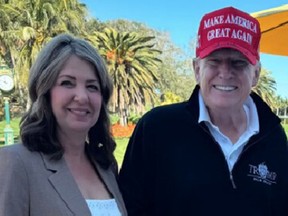Alberta Premier Danielle Smith spoke to reporters after meeting with Donald Trump at his Mar-a-Lago resort over the weekend

Alberta Premier Danielle Smith says that if the Canadian federal government imposes an export ban on Alberta oil going to the United States as a retaliatory measure against expected U.S. tariffs it would precipitate a “national unity crisis.”
“Oil and gas is owned by the provinces, principally Alberta, and we won’t stand for that,” Smith said Monday. “I can’t predict what Albertans would do.”
Smith made the remarks during a virtual press conference with reporters, which followed her meetings with U.S. president-elect Donald Trump at his West Palm Beach Mar-a-Lago resort and his golf club over the weekend.
Mélanie Joly, Canada’s foreign affairs minister, was asked on CTV’s Question Period talk show on Sunday if Canada would consider cutting off energy to the United States in the event of a tariff war, and said “everything is on the table.” Canada is preparing a list of products against which surtaxes could be levied, should Trump bring in his promised 25-per-cent tariff on Canadian goods after he’s inaugurated as president next week.
Joly’s response echoes a pitch made by Ontario Premier Doug Ford, who threatened in mid-December to cut off energy supply to the northeastern United States, should the Trump tariffs become a reality. Smith has staunchly opposed such a measure but said Monday morning that if Trump imposes tariffs, there will need to be a Canadian response.
“We have to wait and see what he does, and then we have to have a measured and mature response to it that hopefully does not damage the relationship or damage Canadian consumers and Canadian businesses too much,” Smith said.
“I haven’t seen any indication in any of the president’s public commentary, or even in the comments that he had with me, that he’s inclined to change his approach,” Smith said.
The Alberta premier has been on an extensive hearts-and-minds campaign in the United States, meeting with governors and appearing on conservative-leaning news programs. She has been making the case directly that U.S. tariffs would increase energy costs to American consumers. She has, however, faced criticism that by boosting Alberta she may be undermining the broader Canadian response to tariffs.
“I’m hoping that by talking about the importance of energy, that we’ll be able to avoid tariffs on every Canadian product,” said Smith.
Since Trump first made threats of tariffs on Canadian exports, which would end more than three decades of free trade between the two countries, Canadian provinces and the federal government have scrambled to respond.
In recent weeks, Prime Minister Justin Trudeau has met with Trump at Mar-a-Lago, and a deputation of cabinet ministers has also travelled to Florida to meet with the incoming president’s transition team. So far, though, there has been little indication that Trump has been persuaded to abandon his plan for tariffs, and it’s all occurring against the backdrop of a domestic political crisis in Ottawa.
“We need somebody at the table who is able to engage with the (Trump) administration saying, ‘You got a four year mandate. I got a four year mandate, let’s deal.’ And we don’t have that right now,” Smith said.
Canada’s premiers and representatives from the federal government are meeting on Wednesday to discuss the tariff response. As well, a joint mission of provincial premiers will travel to Washington, D.C., on Feb. 12 to meet with Trump administration officials and talk trade. The Canadian economy, being orders of magnitude smaller than the United States’, will be far more harmed by a prolonged trade war than the American economy will be, Smith said.
Research indicates that Canada would see tens of thousands of job losses, contractions in the country’s GDP and, in the case of retaliatory tariffs, an increase in the cost of purchasing American-made goods.
“I think the solution is that we we find ways to buy more American goods and and that is, seems to me, to be the very logical step that we should take,” said Smith. “We know that the president’s opening position, we’ve got to try to find a way to dig down and get to a resolution. And I think that will have to happen in earnest once the inauguration happens on Jan. 20.”
“I think the solution is that we we find ways to buy more American goods,” said Smith. “We know the president’s opening position, we’ve got to try to find a way to dig down and get to a resolution. And I think that will have to happen in earnest once the inauguration happens on Jan. 20.”
Our website is the place for the latest breaking news, exclusive scoops, longreads and provocative commentary. Please bookmark nationalpost.com and sign up for our daily newsletter, Posted, here.